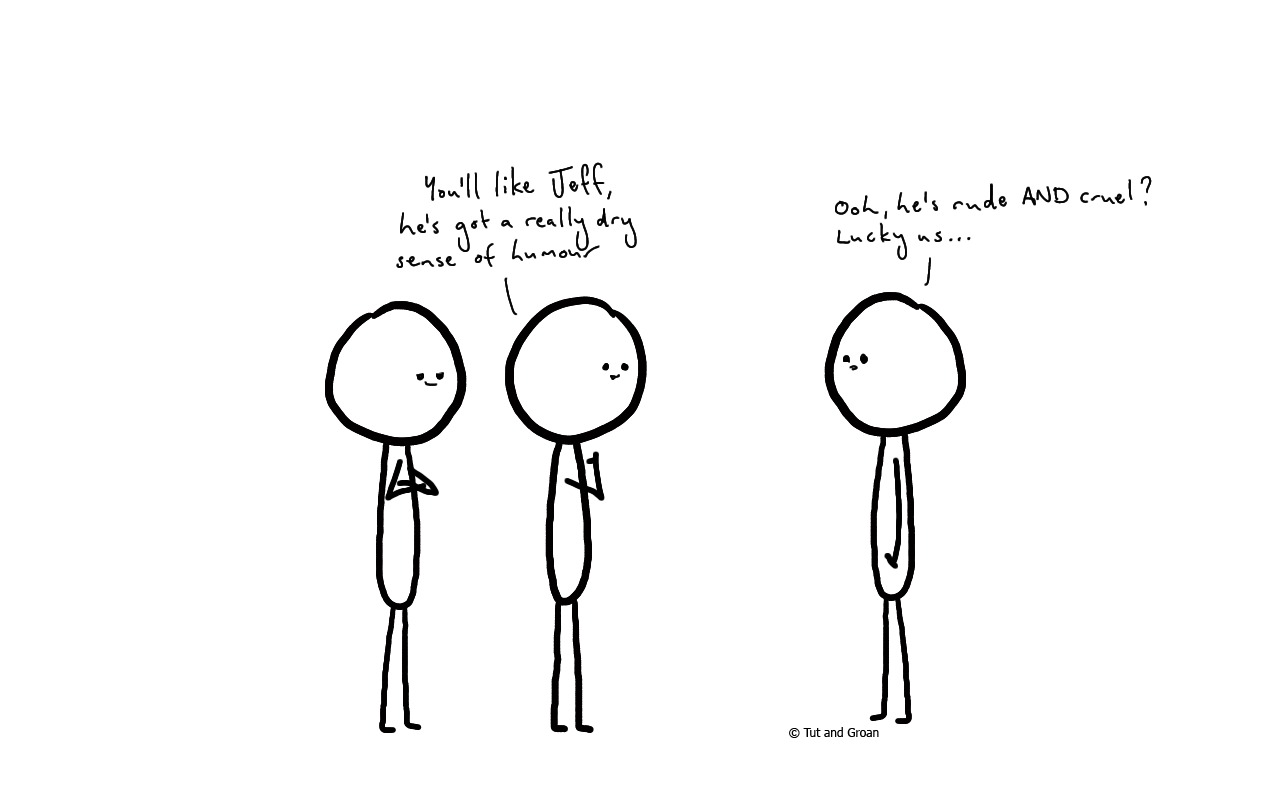What Does Dry Sense Of Humour Mean? Unveiling The Wit That Leaves You Scratching Your Head
Ever wondered what people mean when they say someone has a "dry sense of humour"? Well, buckle up, my friend, because we're diving headfirst into the world of comedy that’s subtle, understated, and oh-so-smart. A dry sense of humour isn’t just about being funny; it’s about delivering jokes with such calmness and precision that you might not even realize you’ve been roasted until it’s too late. Think of it as the sneaky ninja of comedy—quiet, but deadly.
Now, before we get into the nitty-gritty, let’s clear the air. A dry sense of humour isn’t for everyone. Some people get it instantly, while others are left scratching their heads, wondering if they missed something. But hey, that’s part of the charm, right? It’s like an inside joke with the universe. And guess what? If you’ve ever been on the receiving end of one of these jokes, you know exactly what I’m talking about.
So, why does this topic matter? Well, understanding what a dry sense of humour means can help you decode conversations, improve your social skills, and even level up your own comedic game. Whether you’re trying to impress your friends, charm a date, or simply avoid awkward silences, knowing how to use—or recognize—this type of humour can be a game-changer. Let’s dive in!
Read also:Xemina Saenz The Rising Star In The World Of Arts And Entertainment
Daftar Isi
Characteristics of a Dry Sense of Humour
Real-Life Examples of Dry Humour
Why Subtlety Matters in Dry Humour
Cultural Differences in Dry Humour
Benefits of Having a Dry Sense of Humour
Read also:Cimena Saenz The Rising Star In The Entertainment Industry
The Psychology Behind Dry Humour
How to Develop a Dry Sense of Humour
The Impact of Dry Humour on Relationships
The Origins of Dry Humour
Let’s rewind the clock for a moment and explore where this quirky style of comedy comes from. Historically, dry humour has roots in British culture, where sarcasm and understatement reign supreme. Think of it as the UK’s answer to the over-the-top slapstick antics of Hollywood. The British, bless them, have a knack for turning the mundane into pure gold with a few well-placed words.
But it’s not just limited to the UK, folks. Dry humour has made its way across the globe, adapting to different cultures and languages. In fact, many famous comedians and writers, from Oscar Wilde to Monty Python, have used this style to great effect. So, whether you’re sipping tea in London or enjoying a latte in New York, chances are you’ve encountered a dash of dry wit at some point.
How Dry Humour Evolved Over Time
Over the years, dry humour has evolved, blending with other forms of comedy to create a rich tapestry of wit. In the digital age, memes and social media have become fertile ground for this type of humour. People now share clever one-liners and ironic observations that leave their followers either laughing or scratching their heads. It’s like a modern-day version of the ancient art of storytelling, but with a twist.
Characteristics of a Dry Sense of Humour
So, what exactly makes a dry sense of humour, well, dry? Let’s break it down into a few key characteristics:
- Understated Delivery: The joke is delivered in a calm, matter-of-fact tone, as if the speaker is just stating a fact.
- Subtle Irony: There’s often a disconnect between what’s said and what’s meant, leaving the audience to piece it together.
- No Laugh Track: Unlike traditional comedy, there’s no big laugh or exaggerated reaction. It’s all about letting the joke land on its own.
- Intellectual Wit: Dry humour often requires a bit of brainpower to fully appreciate. It’s not about slapstick or physical comedy—it’s about clever wordplay and observation.
These traits combine to create a unique style of comedy that can be both hilarious and perplexing at the same time.
Real-Life Examples of Dry Humour
To really understand dry humour, let’s look at some real-life examples. Imagine this scenario: You’re at a party, and someone says, “Wow, the food here is amazing!” A person with a dry sense of humour might reply, “Yes, I see the caterers are really pushing the boundaries of edible.”
Or how about this classic line from Oscar Wilde? “I can resist everything except temptation.” At first glance, it seems like a straightforward statement, but upon closer inspection, you realize the irony and wit behind it. That’s the beauty of dry humour—it rewards those who pay attention.
Examples in Pop Culture
Pop culture is full of characters who embody the dry sense of humour. Think of Sheldon Cooper from "The Big Bang Theory" or Benedict Cumberbatch’s portrayal of Sherlock Holmes. Both characters deliver their lines with such deadpan seriousness that it’s impossible not to laugh. And let’s not forget Mr. Bean, whose physical comedy is often paired with a dry, sarcastic commentary on life.
Why Subtlety Matters in Dry Humour
Subtlety is the secret weapon of dry humour. Unlike other forms of comedy that rely on shock value or exaggerated reactions, dry humour thrives on nuance. It’s like a magic trick where the audience is left wondering, “Did I just get tricked, or did I miss something?”
This subtlety is what makes dry humour so appealing to those who appreciate intellectual wit. It’s not about hitting you over the head with a joke; it’s about planting a seed of thought that blossoms into laughter. And let’s be honest, there’s something incredibly satisfying about being the only one in the room who gets the joke.
Cultural Differences in Dry Humour
Now, here’s where things get interesting. Cultural differences play a huge role in how dry humour is perceived. In some cultures, like the UK and Australia, dry humour is celebrated and even expected. In others, it might be seen as confusing or even rude.
For example, in collectivist cultures, where harmony and group dynamics are prioritized, dry humour might come across as too confrontational. On the other hand, in individualistic cultures, where personal expression is valued, dry humour is often seen as a sign of intelligence and wit.
Navigating Cultural Boundaries
So, how do you navigate these cultural differences? The key is to know your audience. If you’re unsure whether your dry joke will land, it’s always safer to err on the side of caution. But don’t let that stop you from experimenting. After all, humour is a universal language, even if the dialects differ.
Benefits of Having a Dry Sense of Humour
Having a dry sense of humour isn’t just about being funny; it’s about being smart. Here are a few benefits:
- Improved Communication: Dry humour can break the ice in awkward situations and make conversations more engaging.
- Stress Relief: Laughter is a powerful stress reliever, and dry humour can provide a unique form of comic relief.
- Enhanced Social Skills: Being able to deliver a well-timed dry joke can make you more likable and relatable.
- Intellectual Stimulation: Engaging in dry humour challenges your brain and encourages creative thinking.
So, the next time you’re tempted to crack a dry joke, remember that you’re not just making people laugh—you’re also making them smarter!
The Psychology Behind Dry Humour
From a psychological perspective, dry humour taps into our innate desire for connection and understanding. When we get a dry joke, it’s like solving a puzzle—it gives us a sense of accomplishment and belonging. It’s no wonder that people who appreciate dry humour often form strong bonds with each other.
Moreover, dry humour can be a form of emotional intelligence. It requires empathy to understand when and where to use it, as well as the ability to read social cues. In a way, it’s like a superpower that helps you navigate the complexities of human interaction.
Why Some People Struggle with Dry Humour
Not everyone gets dry humour, and that’s okay. For some, the subtlety can be lost in translation, especially if they’re not used to this style of comedy. But that doesn’t mean they can’t learn to appreciate it. Like any skill, understanding dry humour takes practice and patience.
How to Develop a Dry Sense of Humour
Want to level up your comedic game? Here are a few tips to help you develop a dry sense of humour:
- Observe: Pay attention to how others use dry humour. Watch comedians, read witty literature, and listen to conversations.
- Practice: Try delivering jokes in a calm, matter-of-fact tone. Start with small, subtle observations and work your way up.
- Be Yourself: Don’t force it. Dry humour should come naturally, not feel contrived.
- Learn from Feedback: If your joke falls flat, don’t get discouraged. Use it as a learning opportunity and adjust your approach.
Remember, developing a dry sense of humour is a journey, not a destination. Keep practicing, and you’ll be dropping clever one-liners in no time.
Common Mistakes to Avoid
As with anything, there are pitfalls to watch out for when trying to master dry humour. Here are a few common mistakes:
- Overdoing It: Dry humour is all about subtlety. If you’re too obvious, it loses its charm.
- Ignoring Context: Timing and context are crucial. A dry joke that works in one setting might not work in another.
- Being Too Critical: Dry humour can sometimes come across as harsh if not delivered with care. Always consider the feelings of those around you.
Avoid these mistakes, and you’ll be well on your way to becoming a dry humour guru.
The Impact of Dry Humour on Relationships
Finally, let’s talk about how dry humour can impact your relationships. Whether it’s with friends, family, or romantic partners, dry humour can either strengthen or strain your connections. On the positive side, it can create a shared sense of humour and deepen your bond. On the flip side, it can lead to misunderstandings if not handled carefully.
The key is balance. Use dry humour to enhance your relationships, not overshadow them. And always be mindful of the people around you. After all, laughter is best when it’s shared.
Wrapping It Up
So, there you have it—a deep dive into the world of dry humour. From its origins to its impact on relationships, we’ve covered it all. Remember, a dry sense of humour isn’t just about being funny; it’s about being smart, subtle, and strategic. So, go out there and sprinkle some dry wit into your conversations. Who knows? You might just become the next Oscar Wilde—or at least the life of the party.
Before you go, why not leave a comment or share this article with your friends? After all, sharing is caring, and laughter is contagious. Until next time, keep it dry, keep it clever, and most importantly, keep it real.


